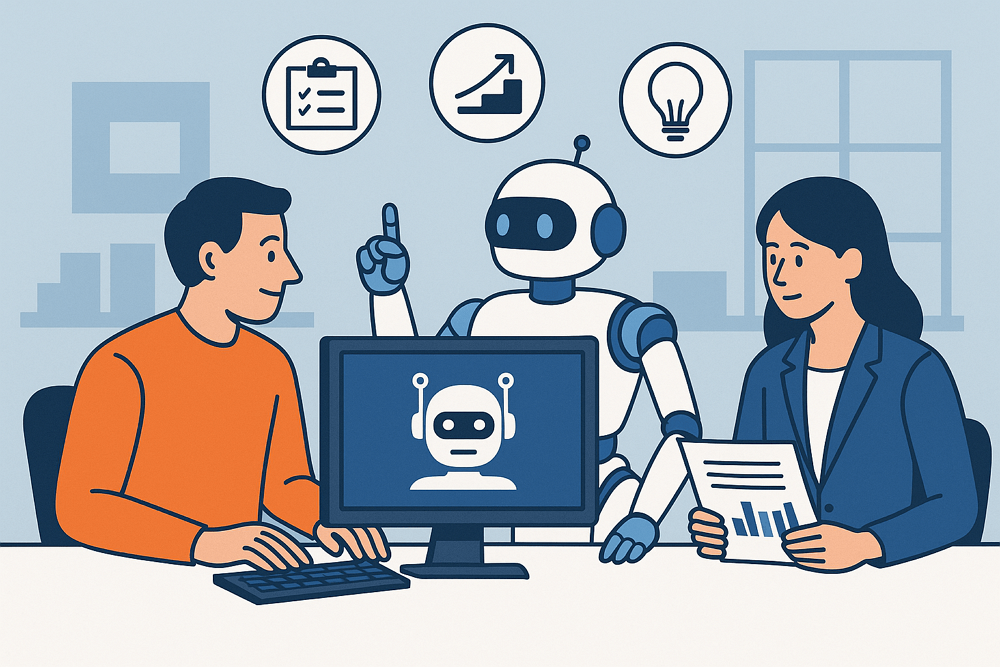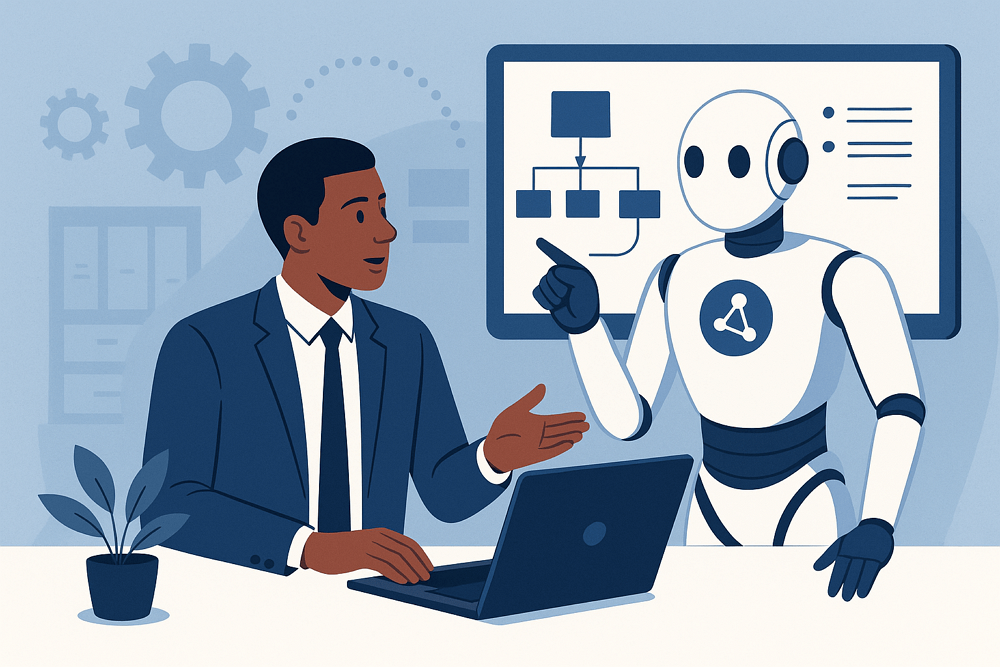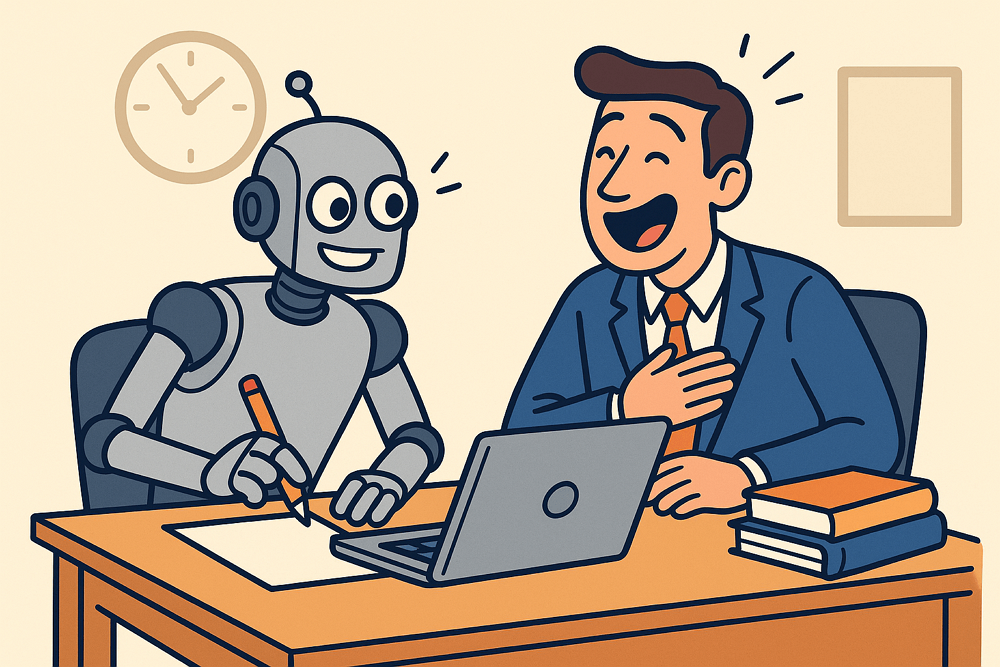Contents
Everyone wants to work with a teammate who finishes tasks quickly and learns from every mistake. Sounds like science fiction, right? But it’s actually happening—thanks to something called agentic AI.
In this article, you will learn about agentic AI—smart computer programs that can plan and do work on their own. These AI tools are now being used in offices, factories, and other places where people work. They don’t just follow simple commands. They can think, decide, and learn as they go. The guide will explore how this is changing the way people work, which jobs are being affected, and what new roles are being created. You will also look at the benefits and the challenges of working with these digital teammates.
Part 1. Understanding Agentic AI
The agentic AI is transforming the workplace, and one needs to find what makes it different from older types of technology. In this section, you will explore how it works and what it can do on its own.
1. Technical Foundations
This advanced technology works by using advanced learning methods. One such method is called reinforcement learning, where the AI learns through trial and error. It tries different actions, sees what works best, and remembers that for the future. It also utilises deep learning to analyse large datasets, including images and numbers. This helps the AI notice patterns and make decisions based on that information. These two methods allow the AI to handle complex tasks and keep getting better over time.
2. Distinction from Traditional Automation
Unlike older machines or programs that only follow fixed rules, agentic AI can learn and adapt on its own. When you are using traditional automation, you need step-by-step instructions every time. On the other hand, Agentic AI can observe and adjust its actions to fit the situation. In short, it is more flexible and better at handling tasks that aren’t always the same.
3. Core Capabilities
Agentic AI has a few key abilities that make it different from earlier technology. First, it can carry out tasks without needing help from a person every time. Once it knows what the goal is, it can plan and act to achieve that goal independently. Second, it doesn’t stop learning once it starts working. It keeps collecting new information and improving how it does things. This means that the more it works, the better it gets. And third, it can make decisions without waiting for someone to tell it what to do. Using what it has learned and the data it sees, it can choose the best path forward—even in situations it hasn’t seen before. These skills make agentic AI a reliable and smart teammate in many types of jobs.
Part 2. Impact on Job Structures
As agentic AI becomes more common in the workplace, it is starting to change how jobs are done. Though machines are taking over some tasks, others are becoming more advanced.
Automation of Repetitive Tasks
One of the biggest impacts of agentic AI is the automation of simple, repetitive tasks. Jobs like data entry, scheduling, basic customer service, and managing inventory used to take a lot of human time. Now, AI can handle many of these tasks quickly and accurately. For example, a digital agent can answer customer questions, process orders, or sort emails without human help. This allows workers to focus on more meaningful tasks that require human judgment and creativity.

Transformation of Knowledge-Based Roles
Agentic AI isn’t just changing low-skill jobs—it’s also transforming roles that need a lot of knowledge and training. In fields like medicine, law, and finance, AI can study large amounts of information and help professionals make better decisions. For instance, doctors can use AI to analyse test results faster, or lawyers can find important case laws more quickly. These tools don’t replace experts—they make their work more efficient and help them focus on tasks that truly need a human touch.
Shift in Skill Requirements
As AI takes over routine tasks, workers now need new kinds of skills. It’s becoming more important for people to understand how AI works and how to use it in their daily tasks. This doesn’t mean everyone needs to be a programmer, but knowing how to work with AI tools and understanding their strengths and limits is becoming a valuable skill. Also, teamwork between humans and AI is becoming more common, so collaboration skills are key.
If you are interested in the impact of AI on mental health, follow this link.
Emphasis on Soft Skills
Even though AI is smart, it still can’t replace human emotions, creativity, or complex thinking. That’s why soft skills like critical thinking, problem-solving, and emotional intelligence are more important than ever. People who can connect with others, understand feelings, and think in creative ways will be in high demand. These are skills that AI can’t easily copy—and they’re what help humans stay valuable in an AI-driven world.
Part 3. Emergence of New Roles
As agentic AI becomes more powerful and common, it’s not just changing old jobs—it’s also creating brand-new ones. These roles are focused on building, guiding, and working alongside AI in smarter and more creative ways.

AI Ethics and Policy Specialists: These professionals make sure AI is used in fair and safe ways. They help create rules and guidelines so that AI doesn’t harm people or break laws.
AI Trainers and Prompt Engineers: They teach AI how to give better answers by feeding it examples and refining the instructions it receives. Their work helps improve how AI responds to different tasks and questions.
AI-Augmented Creativity Specialists: These people use AI tools to create things like videos, graphics, writing, and music. They combine human creativity with AI speed to make content faster and more effectively.
Agentic Engineers: Agentic engineers design and build AI agents that can work on their own. They make sure these digital workers can complete tasks without always needing a person to guide them.
Part 4. Sector-Specific Transformations
Agentic AI is changing many industries in different ways, reshaping both the types of work done and the skills needed.
| Sector | Changes in Work | New Roles and Shifts |
|---|---|---|
| Manufacturing | Automation of assembly lines and the use of AI for predictive maintenance to avoid breakdowns. | Workers move from manual tasks to more strategic oversight and monitoring roles. |
| Logistics | AI helps plan routes efficiently and manages inventory automatically. | New jobs like AI Logistics Analysts and Robotics Technicians are emerging. |
| Customer Service | AI agents handle common customer questions and simple tasks. | Human workers focus on complex customer problems and relationship management. |
| Creative Industries | AI generates content and design drafts to speed up creation. | Creatives now focus more on big ideas, concepts, and refining AI-generated work. |
Part 5. Future Outlook
Looking ahead, the way we work with agentic AI will keep evolving, blending technology and human skills while addressing important challenges.
- Successful workplaces will blend AI’s strengths with human creativity and judgment to achieve the best results.
- Clear policies and regulations will be essential to ensure AI is used responsibly and ethically.
- Employees will need to keep learning new skills to stay relevant alongside rapidly improving AI technologies.
- Collaboration between humans and AI will become a normal part of everyday work across many industries.
- Companies that invest in both AI tools and their people’s development will lead the way in innovation and growth.
Conclusion
Agentic AI is quickly becoming a big part of how we work, changing not just what tasks get done but also how jobs look and the skills people need. It’s not just about robots taking over—it’s about teaming up with smart digital helpers that learn and grow alongside us. This shift brings both exciting chances and new challenges as we figure out the best ways to work together.
Looking ahead, the future of work will be shaped by how well humans and AI can join forces. Staying open to learning, understanding the impact of AI, and balancing technology with human creativity will be key. With the right approach, agentic AI can make work more interesting, efficient, and even more meaningful for everyone involved.


lpn4ll
if1hu6
4vgvhq